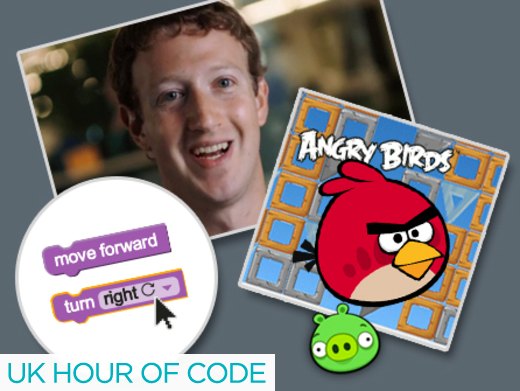Collins is proud to be supporting the UK Hour of Code, an innovative campaign which aims to help UK teachers and students get to grips with the basics of computer programming in just one hour.
Backed by leading figures across the technology and education industries, the campaign is based around a series of engaging, fun tutorials, which introduce the basics of coding and can be accessed by anyone for free on tablets, smartphones and computers.
Coding is the vital building block and language of computer science, and can lead to a wealth of exciting opportunities for students such as being able to write apps and video games, build websites and robots, create animated movies, and so much more. Hour of Code makes it easy for teachers and students to get to grips with basic coding principles and algorithms, whilst giving students of all ages a fun introduction to computer science.
UK Hour of Code is particularly timely as the new curriculum calls for all schoolchildren in England to cover computer science in the classroom from 2014. Simon Peyton Jones, Chair of Computing at Schools, had this to say in support of the campaign, “With the advent in September of the new Computing curriculum, which includes computational thinking and computer science for the first time, the UK Hour of Code is perfectly timed as a springboard for children and their parents, by helping them to dip their toe in the water of this rich, fascinating new subject.”
Who is hour of code for?
Everyone! Hour of Code is accessible to all and the aim is to encourage everyone, from schools to individuals, complete beginners to more experienced users, to start using code. Inspiring young people into computing is particularly important because even though there is a rapidly growing need across the UK for specialist computer skills, only 0.4% of all A-levels sat are in Computing, and less than 7% of those taking A-level Computing are female. At the same time, the IT specialist workforce is forecast to grow nearly twice as fast as average employment growth, according to research by e-skills UK.
The goal of Hour of Code is to demystify the view that coding is only for tech savvy kids and show that anyone, girl or boy can have fun learning this skill, and in doing so can help equip young people with the expertise to succeed in the future job market.
How do I get started?
It couldn’t be easier. Simply head to uk.code.org to sign up as an organiser and download the teacherguide, which offers step-by-step instructions to help you prepare for participating in Hour of Code. As well as the tutorials, there’s also a wealth of teaching resources including videos, posters and factsheets to help inspire your students’ interest in computer science. You can even download and print out ready-made certificates of achievement, which can be a real motivator for students.
Remember, you don’t need to have a full school computer suite to take part; students can access the tutorials on tablets and smartphones or take part in the tutorials in small groups using one computer, and ‘offline’ lesson plans mean the tutorials can be delivered without a computer at all!
Join the conversation!
A staggering 1.1 million people have already tried the Hour of Code in the UK – you can keep up to date with the campaign’s progress and share your stories on Twitter using #HourofCode or #UKHourofCode.
Don’t miss out – the week of Hour of Code starts 3rd March, sign up your school today and take the first step to understanding this life-changing skill!




